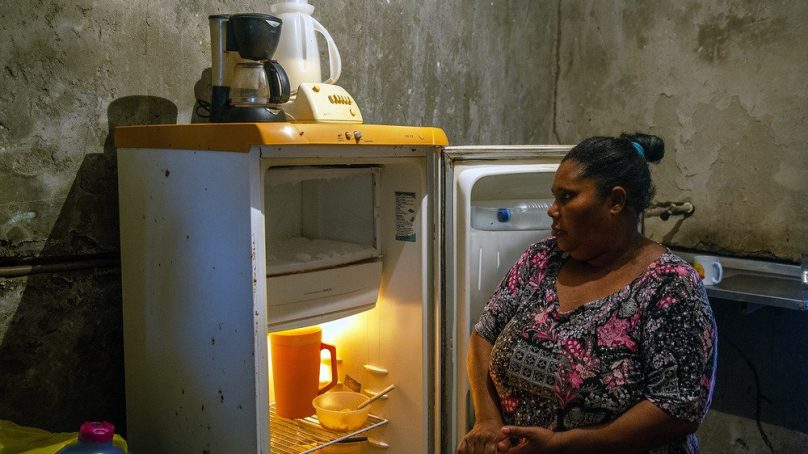
Brazil is grappling with severe food insecurity, which is characterised by the inability to eat for a whole day; while moderate food insecurity means that a person is concerned or uncertain about future access to food, or the quality of food they can access is compromised.
“For the past few years, we have seen the deterioration of [both] the indexes,” said Salles-Costa. “But the pandemic has aggravated the scenario even further.”
Asked to explain the cause of the decline, Brazil’s government insisted that these earlier programmes were wrapped into other larger ones, and that new “safety net” initiatives had been created.
“[Zero Hunger’s] actions were incorporated into programmes such as Bolsa Família (PBF), an initiative that contributes to the fight against poverty and inequality in Brazil, serving families living in poverty and extreme poverty,” said the ministry of citizenship in an emailed response.
The ministry did not provide a breakdown of funds allocated specifically for hunger relief, but said that since April 2020 a total of more than R$365 billion has been invested in social assistance policies, including nearly two million food baskets distributed throughout Brazil to more than 850,000 families this year alone.
But researchers say the situation on the ground demonstrates that any efforts to bundle the programmes together have fallen way short of the mark. A survey conducted by CUFA and the research company Locomotiva this year of residents in 76 Brazilian favelas reveals that the majority of families eat fewer than two meals a day.
Another survey – by Food for Justice from Freie Universität Berlin in Germany, in partnership with researchers from the Federal University of Minas Gerais and the University of Brasília – found that 59 percent of households interviewed in November and December 2020 had reduced their daily food consumption.
A growing foreign market for commodities like soy and other grains – and a recent spike in fuel prices – have also hindered food security for Brazilians.
With rising export demands from foreign buyers, especially China, Brazilian farmers are opting to sell their crops abroad for more money, leaving the domestic market unattended. The country is also facing its worst drought in over 90 years, and a poor harvest could see a steep decline in production in the coming months, increasing prices even further.
“Here at Fiocruz, we regret this government’s negligence in relation to food security in Brazil,” said Oliveira e Silva. “There is no dialogue between the federal government and sectors of society that could help [with the food insecurity crisis]. There is no statement from any minister in the Bolsonaro government regarding hunger; it is a taboo.”
The Citizenship Ministry responded to this criticism by stating that it has also worked to continuously strengthen the Food Acquisition Program, whereby the government buys food produced by family farmers and allocates it to those going hungry. According to officials, in 2020 alone, more than R$247.6 million was transferred through the programme to more than 54,000 families. In 2021, meanwhile, the government launched the Brazil Fraternal Initiative – to acquire and distribute food baskets to those who most need it.
But with 116 million Brazilians facing food shortages, experts say these newer measures still fall far short of what is needed, and they expect a further rise in hunger, food insecurity, and poverty unless more drastic action is taken.
We do not think that the solution to hunger is to distribute food baskets or take leftovers from restaurants or food donations from people to distribute to the population,” said Daniel Souza, a spokesperson for Brazilian NGO Citizenship Action, which says it was forced to resume emergency food aid deliveries in 2017 after a 10-year pause. “We don’t want to do that,” said Souza. “We want the government to assume its role again.”
Unless the innovative government policies of the early 2000s are revived, experts say even the end of the pandemic won’t make the situation better.
“Either the social policies in combating hunger and poverty that were adopted in 2003 to 2004 to reduce this hunger scenario in Brazil are brought back, or we are just going to keep reproducing the increase in hunger, the increase in serious food insecurity,” said PENSSAN’s Salles-Costa.
For five months during 2020, the government handed out emergency aid of R$600 ($121) each month to nearly 70 million people who lost their income due to the pandemic. This, said WFP’s Balaban, led to smaller numbers going hungry. But in 2021, the government has significantly slashed this aid, providing an average of R$275 ($55) for three months to 35 million people.
“Without a robust return to government social spending, there will be little chance of stopping hunger,” said Balaban.
“The cost of hunger is much greater than the investment needed to avoid it. We used to be an example of public policies to fight hunger. We helped other countries to create public policies adopted here in Brazil. Everyone came here to see our programmes. They are now doing great with these policies, and we’ve backtracked.”
- The New Humanitarian report











